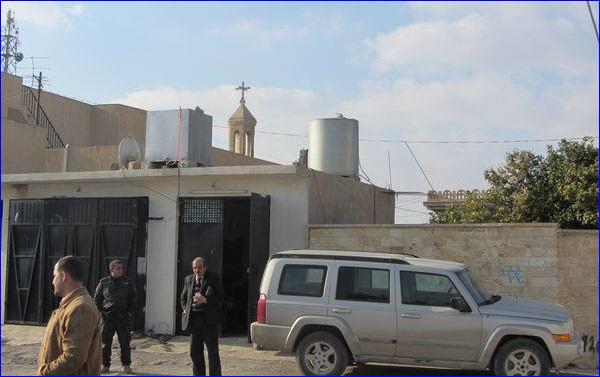
Forging Demographic Change in Iraq At the Expense of Assyrians
AINA – Bar Daisan- 31/1/19
Goettingen, Germany (AINA) — In a press release dated January 24th, the Society for Threatened Peoples (STP) in Göttingen has called attention to new problems arising for the Assyrians (known also as Chaldeans and Syriacs) in the Nineveh Plain, north and east of the city of Mosul, Iraq. Assyrian “representatives fear a massive demographic change at the expense of their ethnic group,” says the release.
After the expulsion of the Islamic State (IS) from the Northern Iraqi province of Mosul, “more and more Muslims are settling there,” said STP’s speaker Kemal Sido. One of the cities impacted by these actions is Bartella, which was liberated from IS in October 2016 with support of the Iraqi Special Operations Forces and Nineveh Plain Protection Units (NPU). STP is calling on “the Iraqi central government and Kurdistan Regional Government [KRG] to clarify the administrative affiliation of this and other ‘disputed’ areas in order for their communities to shape their future,” and reduce tensions between the ethnic groups. The area is labeled ‘disputed’ by the KRG, as the KRG, eying Nineveh Plain’s oil resources, seeks control of the region.
A joint letter (AINA 2018-10-13) signed by the STP and Assyrian Federation in Germany was sent to Nechirvan Barzani, President of the KRG, on October 4th, 2018, urging Kurdish authorities in northern Iraq to respect Assyrian rights and assure political participation in the KRG region and to give pro-active support to Assyrians. According to Aziz Said, President of the Assyrian Federation in Germany, who signed the letter, the “appeal remained unanswered by the KRG.” Said expressed concerns in view of the worrying news about land grab on the expense of Assyrians, saying “our Federation is pleased with the STP release, which raises the issue of demographic change at the expense of Assyrians in the Nineveh Plain and demands more participation. The expulsion of the Nineveh Plain’s local population by IS in 2014 is seen by some people in hindsight as a welcome act to establish new facts on the ground.”
Related: Timeline of ISIS in Iraq
Related: Attacks on Assyrians in Syria By ISIS and Other Muslim Groups
The Nineveh Plain has been historically and continuously populated by Assyrian Christians and was one of the regions of Iraq where they could live in relative calm and peace until the IS attack in 2014. Assyrians have long demanded the establishment of a self-governed province in the Nineveh Plain under federal jurisdiction. In January 2014, the Iraqi Council of Ministers authorized the creation of such a province. But because of the onslaught of IS it could not be implemented.
According to the Assyrian Policy Institute (AINA 2018-12-27) “nearly fifty percent of its previous Assyrian population has returned since liberation, though post-2014 shifts signal ongoing demographic change in the district. Many local Assyrians fear that the Shabak community is using the post-IS instability to seize a greater claim over cities like Bakhdida and Bartella.” The number of ethnic Assyrians that have returned to Bartella is less than 10,000 (from more than 20,000 prior to 2014) while the number of Shabak residents has increased.
Last month the API pointed to a letter of Qusay Abbas Mohammed, a Shabak MP, who called for the distribution of public lands in Hamdaniya District in the Nineveh Plain to Shabak families. The letter is signed by additional 58 members of parliament and has caused concerns to the local Assyrian community, who fear that demographic change might be supported by the central government.
Currently, NPU’s authority to secure the region and its towns “is constrained by Shabak forces (operating primarily in Bartella), which are greater in number and organized under Brigade 30 of the Popular Mobilization Units (PMU), also known as al-Hashd al-Shabi. Brigade 30 is affiliated with the Shabak Democratic Assembly and operates under the leadership and command of the Badr Organization with the backing of powerful non-local PMU forces,”, reports the Assyrian Policy Institute.
About 80 percent of the Assyrian population of Bartella belongs to the Syriac Orthodox Church, the remaining 20 percent are Syriac Catholics. They all speak Suret, a modern eastern dialect of Assyrian. In recent years, members of the Shabak minority have settled in the town. The Shabak are mostly Shiite Muslims.
Since 2013, a new district with the project name “Sultan City” is emerging in Bartella. 182 residential units are planned. “Only Muslims could afford to buy a very expensive home there, say local Christians who lost their fortunes through the war,” says STP. Assyrians “are calling for Christian families to move there, because the buildings would also be built on their land, which, after all, has always belonged to Christians,” adds STP’s speaker Sido. There are already reports that land registers are forged in order to reject criticism. An apartment in the “Sultan City” costs in average around 75 million Iraqi dinars, equivalent to about 55,000 Euros.
© Assyrian International News Agency .


738964 203978My California Weight Loss diet invariably is an cost effective and versatile staying on your diet tv show produced for people who locate themselves planning to drop extra pounds and furthermore ultimately maintain a significantly healthier habits. la weight loss 905957
140574 154130Hi, in the event you want to get higher rankings, you need to have a look at the plugin I left in my link, it will help. 785107